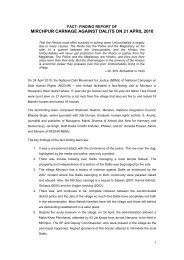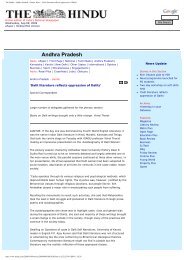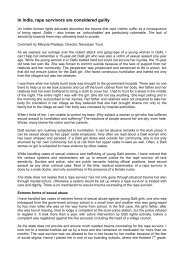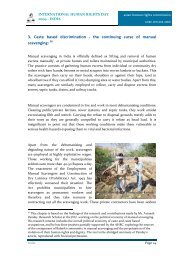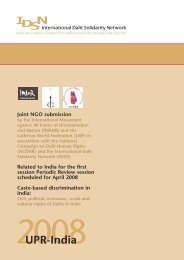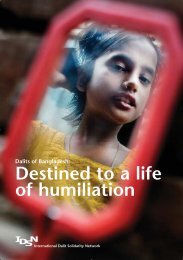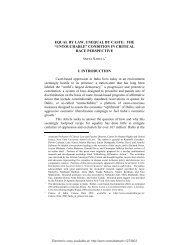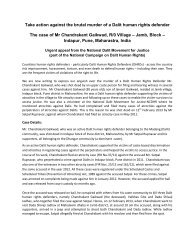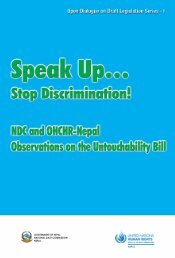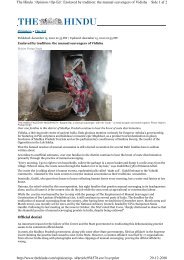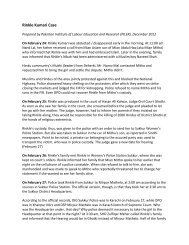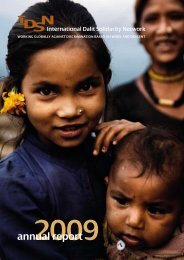A Global Alliance Against Forced Labour - International Labour ...
A Global Alliance Against Forced Labour - International Labour ...
A Global Alliance Against Forced Labour - International Labour ...
Create successful ePaper yourself
Turn your PDF publications into a flip-book with our unique Google optimized e-Paper software.
GLOBAL ACTION TO COMBAT FORCED LABOURbonded labour question in Nepal beyond the kamaiyasystem. In India, by contrast, little academic researchon bonded labour has been conducted in recent years.Some specific research has been commissioned by theILO project on the prevention and elimination ofbonded labour in South Asia (PEBLISA), includingon the gender dimensions of bonded labour and onthe perspectives of agricultural employers, both inAndhra Pradesh. 10 Project research has also produceda “Vulnerability to Debt Bondage Index”, intended asa tool for targeting interventions to the groups mostat risk of falling into bonded labour.320. Pioneering efforts elsewhere in Asia have brokenthe ice on a previously taboo subject. Experience inMongolia and Viet Nam, for example, demonstratesthe complementarity of processes leading to ratificationof ILO Conventions and promotional assistancefor understanding and solving problems in practice.321. The Government of Mongolia announced itsintention to ratify both forced labour Conventions,and requested ILO assistance in 2001. Initial consultationssuggested that forms of forced labour thathad prevailed in the central command economy,despite being outlawed, might not have disappearedentirely, and that market forces might have givenrise to some new forms. It was agreed to conducta study exploring issues including forced overtimein manufacturing, and prisoners being made availableto private companies in the textile and garmentindustries. Tripartite workshops were held to agreeon terms of reference and to discuss and validate thefindings. Various follow-up activities are now underconsideration.322. A similar process is under way in Viet Nam,paving the way for ratification. A high-level interministerialtask force has been set up to oversee acomprehensive study of forced labour. 11 A series ofworkshops and meetings since 2002 resulted in agreementon parameters for the study. Field studies werecompleted, and desk reviews will produce comparativeanalyses of relevant legislation in the nine areasof possible forced labour under consideration. Theprocess so far has succeeded in mobilizing a widerange of government departments under the leadershipof the Ministry of <strong>Labour</strong>, Invalids and SocialAffairs (MOLISA), creating widespread acceptanceof the relevance to Viet Nam of the elimination offorced labour and building consensus on what forcedlabour means in the Vietnamese context. This technicalunderstanding must now be developed further,passed on to the political leadership and translatedinto changes in law and practice.323. Recent ILO research on trafficking has aimedto shed light on trafficking for labour exploitation,in addition to sexual exploitation, examining bothsupply and demand factors. In Asia, the findingsof IPEC rapid assessments of child trafficking in anumber of origin countries 12 have fed into policyadvice and project design. In the Greater MekongSubregion, for example, research has shown that mosttrafficked victims initially leave their homes voluntarilyin search of better economic opportunities,but end up in highly exploitative situations of forcedlabour and the worst forms of child labour. IPEC’sMekong Subregional Project to Combat Traffickingin Children and Women 13 is therefore addressing traffickingwithin the larger labour migration framework,developing bilateral and multilateral memorandaof understanding on trafficking. An IPEC regionalstudy on the demand for trafficking in Asia, coveringBangladesh, India, Nepal, Pakistan and Sri Lanka, iscurrently under way.324. Studies can focus on particular target groups.For example, in the Philippines and Indonesia, a newSAP-FL project on mobilizing action for the protectionof domestic workers from forced labour and traffickinghas undertaken situation analyses on migrantdomestic work. 14 The study in the Philippines, acountry which has adopted significant measures forits migrant workers, nevertheless uncovered significantgaps in their protection. In Indonesia, the studyrevealed various abuses, including situations of forcedlabour suffered by aspiring migrants in pre-departuretraining camps, an aspect that has been raised by theILO supervisory bodies. 15325. SAP-FL has given particular priority to improvingknowledge of the demand for forced labour,especially as it relates to trafficking into industrializedcountries. Conceptual research has shed light onthe economic underpinnings of trafficking linked tochanging industrial demand patterns. 16 In westernEuropean and other industrialized countries, field10. S. Subrahmanyam et al.: <strong>Labour</strong> and fi nancial markets from employers’ perspective: The case of Ranga Reddy District in Andhra Pradesh(Hyderabad, India, Centre for Economic and Social Studies, unpublished document, Dec. 2003); B. Chakravorty: Study on bonded labourwith a gender lens in Rangareddy District, Andhra Pradesh (unpublished document, Feb. 2004).11. The task force includes representatives of MOLISA, the Prime Minister’s Office, the Ministries of Home Affairs and Public Security, theOffice of the National Assembly and the Supreme People’s Court.12. Bangladesh, China (Yunnan Province), Lao People’s Democratic Republic, Nepal and Thailand.13. Covering Cambodia, China (Yunnan Province), Lao People’s Democratic Republic, Thailand and Viet Nam.14. The project involves the Philippines and Indonesia as source countries, but also China (Hong Kong Special Administrative Region),Malaysia and Singapore as destination countries. IPEC also operates a project on the internal labour migration of girls and women betweenfive provinces of China (Anhui, Guangdong, Henan, Hunan and Jiangsu Provinces).15. ILO: Report of the Committee of Experts on the Application of Conventions and Recommendations, Report III (Part IA), <strong>International</strong> <strong>Labour</strong>Conference, 92nd Session, Geneva, 2004, pp. 137-138.16. G. Van Liemt: Human traffi cking in Europe: An economic perspective, Special Action Programme to Combat <strong>Forced</strong> <strong>Labour</strong>, DECLARATIONWorking Paper No. 31 (Geneva, ILO, 2004).71



